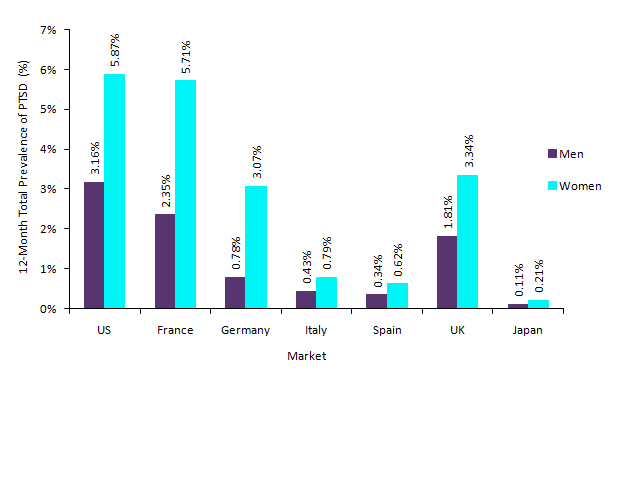Post-traumatic stress disorder (PTSD) is a psychiatric disorder that can occur in people who have experienced or witnessed a traumatic event such as a natural disaster, a serious accident, a terrorist act, war/combat, rape, or other violent personal assault. As the intensity of psychological impact of the Covid-19 pandemic is increasing worldwide, GlobalData epidemiologists expect a significant increase in total prevalence of PTSD, with the risk for women being twice as high as that for men.
PTSD affects as many as one in four people who experience traumatic events and contributes to marked functional disability, health impairment, and social dysfunction. Although most survivors of trauma experience elevated stress responses in the immediate aftermath of trauma exposure, most of these reactions abate in the ensuing period, and only a minority of survivors develop a long-standing disorder. This process potentially involves fear conditioning at the time of trauma, resulting in over-consolidation of trauma memories.
The Covid-19 pandemic has the potential to increase stress and anxiety, both because of the fear of infection and because of uncertainty about how the outbreak will affect people socially and economically. After the severe acute respiratory syndrome (SARS) outbreak in 2003, front-line healthcare workers and people who were self-quarantined exhibited the symptoms of PTSD. A study published by Mak and colleagues in 2010 reported that a total of 47.8% of the subjects had PTSD at some point in time after the SARS outbreak and all of these subjects identified the SARS outbreak as the index trauma.
People who tested positive for Covid-19 and survived after mandatory quarantine could develop long-term mental health issues such as stress, anxiety, and fear of the disease. Even if people are not directly affected by Covid-19, the pandemic has been a significant stressor on people’s lives across the globe. A recent study done by Liu and colleagues in March 2020 found that the prevalence of PTSD a month after the Covid-19 pandemic in the most affected areas in China was 7.00%. This is comparatively a doubling rate versus a previous estimate of a reported total prevalence of 3.7% during the post-SARS epidemic for an extrapolated target population in Taiwan. The study by Liu and colleagues analysed the psychological impact of Covid-19 in Wuhan and surrounding cities in Hubei Province, which is the hardest-hit area of Covid-19 in China, between January 30 and February 8, 2020. The researchers also revealed that PTSD symptoms are more common among women than men. Early epidemiological investigations of PTSD prevalence among the Chinese general population for those who have and have not been exposed to any kind of trauma reported varying prevalence rates of up to 1.0%, while post-disaster samples gave higher rates of PTSD prevalence. Another study done by Sun and colleagues in March 2020 reported that the prevalence of PTSD among the public in mainland China one month after the Covid-19 outbreak was 4.6%. As a rough estimate, this study reported the prevalence of PTSD as 5.2% in a low-risk population, 18.4% in a high-risk population, and 4.4% in healthcare workers. This report also underscores that the risk of developing PTSD is higher in women than men.
Based on GlobalData’s report, Post-Traumatic Stress Disorder: Epidemiology Forecast to 2028, in the seven major markets (7MM: US, France, Germany, Italy, Spain, UK, and Japan), US had a higher 12-month total prevalence of PTSD among men and women, with 3.16% and 5.87%, respectively. Among five major European countries (France, Germany, Italy, Spain, and the UK), France had the highest 12-month total prevalence of PTSD among men and women, with 2.35% and 5.71%, respectively. In the 7MM, the 12-month total prevalence of PTSD for men ranges from 0.11–3.16%, and for women range from 0.21–5.87%. This corresponds to more than 17.3 million people across these markets who are already suffering from PTSD.
Figure 1 presents the 12-month total prevalence of PTSD in the 7MM for men and women ages 18 years and above in 2018.

US Tariffs are shifting - will you react or anticipate?
Don’t let policy changes catch you off guard. Stay proactive with real-time data and expert analysis.
By GlobalDataGlobalData expects that the Covid-19 pandemic may cause even higher prevalence of PTSD in the severely affected areas where the population is at high risk of infection and where significant changes to daily living had occurred due to pandemic response. Considering Covid-19’s effects are global and long-term, this psychological impact of Covid-19 would be seen across many regions in the world. PTSD is already a significant healthcare issue that is often underdiagnosed. Public health agencies need to be able to address fall-out of the Covid-19 pandemic even after the infection is under control.





